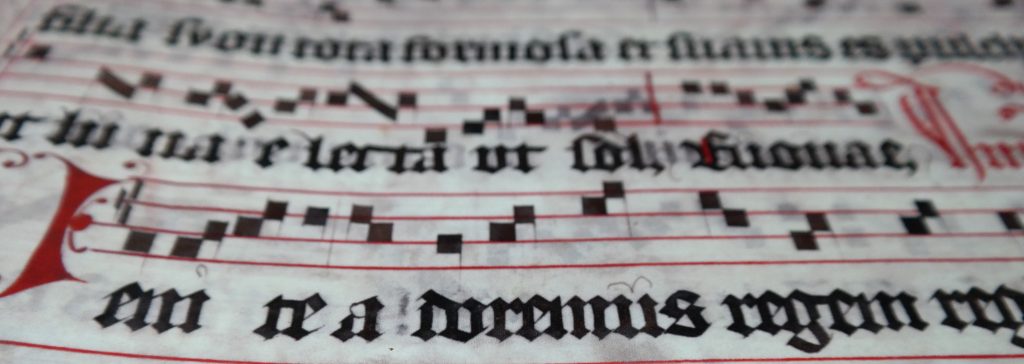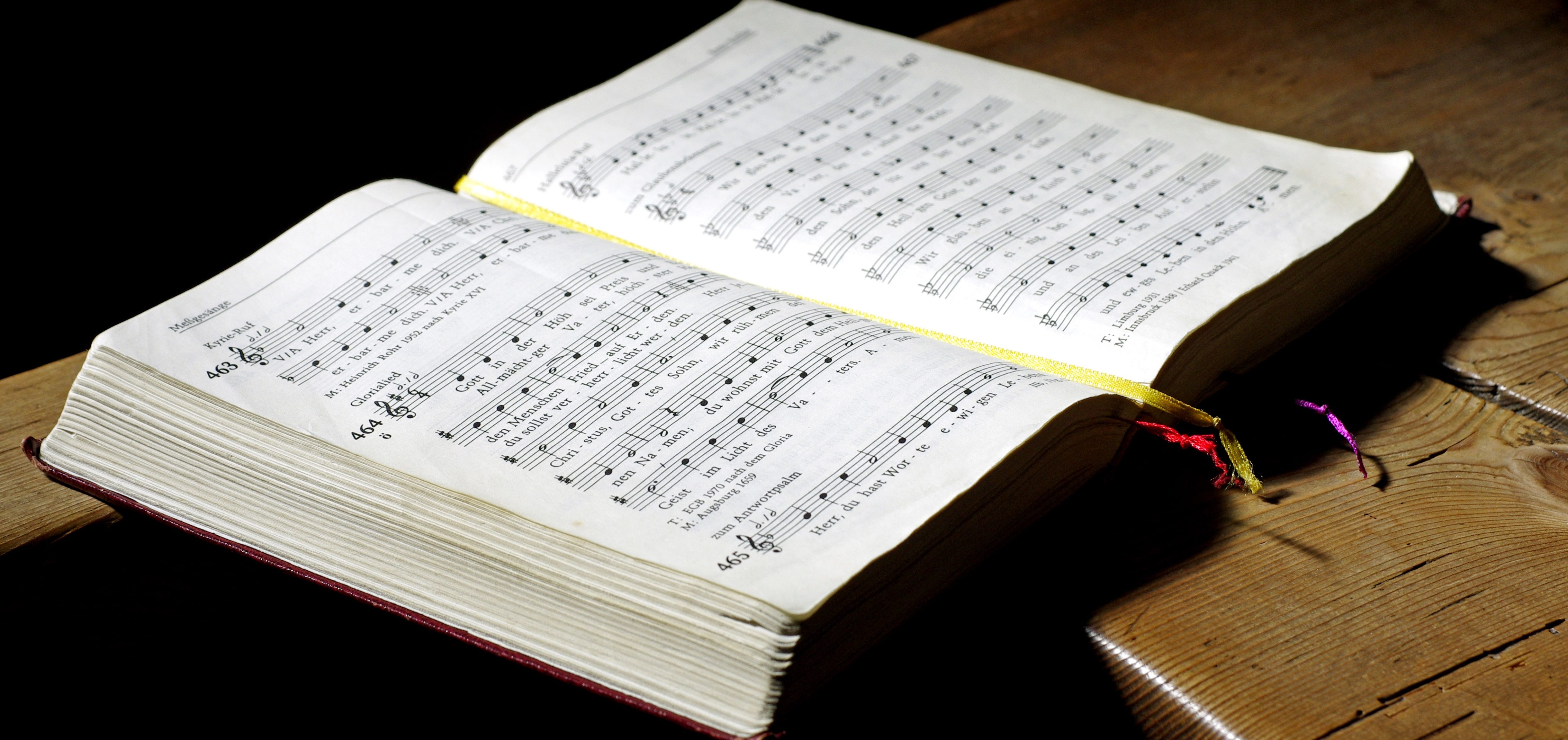The Resonance of Our Hearts
“Then they were to every morning, and also in the evening,
be ready to praise and praise the Lord"
(1 Kron. 23:5, 30; 25:1-7).
The service of the singers
When King David grew old, he gave his son Solomon directions for building the temple and also made a division of labor for the Levites. David is a type of Christ as our Lord, who is clothed with divine authority and therefore sets order in God's house. Christ does that through His Spirit and the order within the Church – because that is now the spiritual house, the temple of God – bears the stamp of that. It is not an order that men devise, but the institution of the Holy Spirit, according to the directions of the Word of God (1 Cor. 14:33, 40).
This also applies to the ministry of the 'singers', who fortunately still exist today. After all, Christ Himself is the great Choirmaster of His people. He opens up the praises in the midst of His brethren (Ps. 22:23; Heb. 2:12). He took the new song to his lips when He was raised from the depths of death. It is the song of redemption, the song of the resurrection. This song has resonated in our hearts, and we as redeemed consent to it (Ps. 40:4). The new song is an everlasting song of praise to the Lamb who was slain (Rev. 5:9), just as the work of the temple singers was a perpetual occupation in the offering of the daily burnt offerings.
The service of singing in the house of the Lord is not yet mentioned at the tabernacle. This attitude is apparently due to David; he was "beautiful in the psalms of Israel" (2 Sam. 23:1). The tabernacle was God's dwelling during the desert journey, and that journey certainly did not give rise to singing.

As far as we know, the people of Israel have only sung twice in the wilderness, at the very beginning and almost at the end of the journey. The first song was the song of liberation after the crossing of the Red Sea (Ex. 15), the last song of praise for the spring of water with which God refreshed the people when the journey was nearing its end (Num. 21). Israel also danced and sang around the golden calf, but that song was of course not to the glory of God (Ex. 32).
The singing time
It was not in the wilderness, but only in the Promised Land that the singing time had come to speak in the words of the Song of Songs (Song of Solomon 2:12). We also see that that time did not come immediately after Israel's entry into Canaan, but only in the days of David and Solomon. Then came a time of true rest, a settled dwelling place for the Lord God, and regular worship to the glory of His name. Namely, the appointment of the singers was related to finding a final resting place for the ark, the symbol of God's presence. When the ark no longer had to lead the people into battle, a situation of tranquility arose that was required for the temple service and the service of the temple singers (see 1 Chr. 6:31-32; 15-17; 22: 6-19; 28:2ff.; 2 Chr. 6:41-42; Ps. 132).

So it took an age of rest and peace, a "man of rest" (King Solomon), and a "house of rest" (ie the temple) for the continual song of praise to God. The service of the Levite singers was based on this state of established peace in the land of God's promise. God's favor was now certain in the person of the anointed king, who reigned by the grace of God. The ark had found its resting place on Mount Zion, and God dwelt in the midst of His people. Therefore, the singers could continually sing that God's mercy endures for ever. We first hear this refrain when David brought the ark to its resting place, and it was sung again at the dedication of the temple (1 Chr. 16:34, 41; 2 Chr. 5:13).
The new song
This is of course also important to us. As God's favor to Israel was certain and sure in the person of the king whom He had given to the people, so may we be assured of God's favor because He looks upon us in His beloved Son in grace. Through Christ we have peace with God, and have also gained access to God's grace and favor (Rom. 5:1-2). We have been delivered from the power of darkness and transferred into the kingdom of the Son of His love, the Man after God's own heart (Col. 1:13). It is a realm of light and love, a realm of "righteousness, peace, and joy in the Holy Ghost" (Rom. 14:17).
Shall we not then sing praises and praise God for His everlasting goodness? After all, a time of rest has come for us too! We know the Prince of Peace, and we also know that He has found a resting place with His redeemed people. We have every reason to be thankful and happy. The theme that God's loving-kindness is for ever is continually giving rise to a song of praise in the church, to the glory of the Father and the Son.
God's mercy forever and ever
continually gives rise to a song of praise in the church, to the glory of the Father and the Son.
It's a song that will sound forever. Even today, so to speak, the choirs of the singers in God's temple are lined up to sing and rejoice to the Lord through psalms, hymns, and spiritual songs (Eph. 2:17-22; 5:19).
It is important that Paul speaks of singing and rejoicing in our hearts. The New Testament contains no regulations regarding musical instruments in Christian worship. It is about worship in spirit and truth. Elsewhere the fruit of the lips confessing His name is mentioned (Heb. 13:15). In Colossians 3:16, the song of praise is linked with mutual teaching and admonition: "...as you in all wisdom teach and admonish one another with psalms and hymns and spiritual songs, and sing in grace in your hearts unto God." To sing 'in grace' means to sing and give thanks in the consciousness of God's rich grace – as expressed in the Old Testament in the repeated refrain: '(…) for His mercy endureth for ever!'

That the "singing service" of the Christians is related to teaching and admonition indicates that there is a prophetic element in it, which is for the edification of the other. Not only is God honored by our worship, it also builds up the fellow believer in the faith. Interestingly, the temple singers are said to have prophesied in 1 Chronicles 25:1-5. Their prophetic hymns were for the glory and glorification of God, but also for the instruction of the people.
A time of revival
Finally something about the position of the Levite singers in the time of Ezra and Nehemiah. That was the same time in which the chronicler lived, remembering the former glory under David and Solomon. A remnant had returned to the Promised Land, to the place where the Lord had placed His name. In Babylon the singers had hung their harps on the willows. How could they sing one of the songs of Zion, a song of the Lord, in a strange land (Psalm 137)? How could they there sing of Zion, the mountain of grace, of the sanctuary of the true God and the reign of His king?

But once they returned to Jerusalem, they were able to resume their duties. It was a time of revival, of restoration, of rebuilding (respectively of the altar, the temple and the city wall). When the foundation of the new temple was laid, the singers sprang into action. Again the song sounded that God's mercy endures forever (Ezra 3:10-11). The choirs also played an important role at the dedication of the wall of Jerusalem (Neh. 12:27ff.). Everything happened according to the commandment of David and Solomon, for "in that time of old is the origin of the singers, of the song of praise and the praises of God" (Neh. 12:45-46). And so, in a time of decay, we too may go back to the statutes which God has given to His Church from the beginning through the exalted Lord. In the restoration of worship around the 'altar',
Source: Chapter 5 from 'Growing in grace' by Hugo Bouter. Reprinted with permission,



